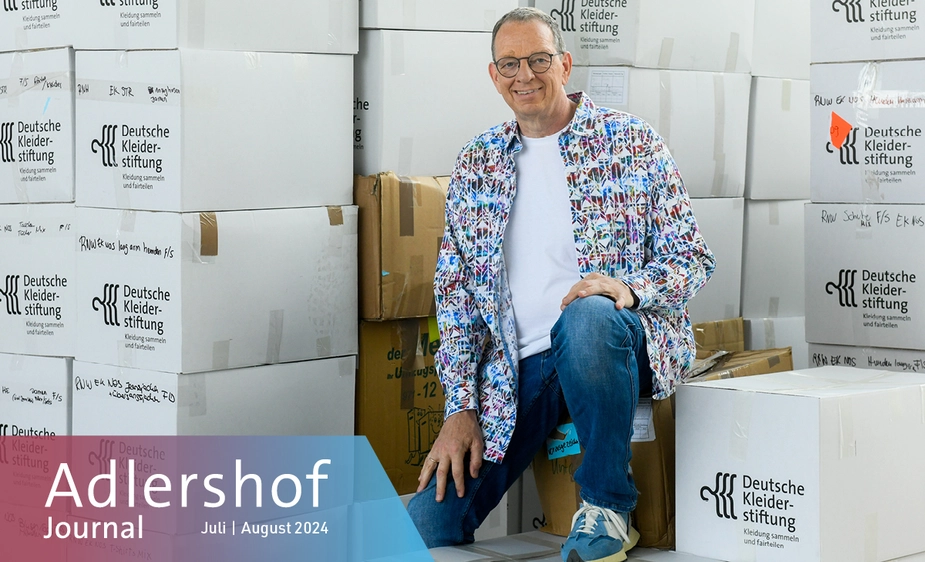New life for old clothes
The German Clothing Foundation is creating a CharityLab at Am Studio 16
Those seeking refugee from war, displacement, and disaster often come with nothing more than the clothes on their back. For around 70 years now, the German Clothing Foundation has been helping people in these and other emergency situations. In 2023, it donated more than 250,000 items of clothing to Ukraine alone. On 19 June, it will open its new CharityLab in Adlershof. The Lab will not only serve to sort and store clothing donations but also initiate collaborations with students, sustainable brands, and designers. The goal: giving new life to old fabrics—here and abroad.
“The German Clothing Foundation was founded in 1957 by a pastor in West Berlin. It began work as an association and sent parcels to the former GDR,” says Ulrich Müller, the chair of the executive board of the German Clothing Foundation. An expert in fundraising and logistics, who has been working in non-profit all his life, he has been at the helm of the foundation for 16 years and has been continually expanding its scope in the past years. “Today, we are making clothing available to people in need all over Europe—during the catastrophe in Idomeni, Greece, for example, or in Albania, where the demand is very high. Our focus is on Eastern Europe.”
What is needed depends on the weather conditions and emergencies on the ground—and so the foundation collects a variety of product groups. They range from rain jackets to sweatpants to trainers. The mostly used but high-quality clothing is donated by people all over Germany. “We are the only non-profit organisation in the country offering free shipping on donations. This means people can pack a box at home and send it to us free-of-charge. We are currently processing 100,000 such parcels every year,” says Müller, gladly. The foundation donates the clothing to people abroad or sells it in its charity shops to finance aid projects. To do so, the team frequently employs long-term job seekers—as warehouse workers, for example.
The clothing donations are unpacked, sorted into product groups, and parked temporarily in the foundation's 2,500-square-metre storage space in various locations across Germany. The most recent addition is the CharityLab in Adlershof. The Lab is much more than a logistics hub, says Eike Müller, who manages the site. “In the context of the European Green Deal, which aims to make Europe climate-neutral, we at the lab are thinking in terms of a circular economy for textiles and engaging with sustainable brands, designers and up-cyclers.” The CharityLab Adlershof has a good 100 square meters available for workshops and showrooms. They are planning a repair service for used clothing as well as a material pool for committed recyclers. The Lab uses textiles from unusable clothing donations to create something new.
Vertical gardens, for example. To draw up designs for this, the Lab has provided textile technology students with fabric scraps. “Wool and denim can store a certain amount of moisture, while rain jacket fabrics can make sure the vertical garden is sealed,” says Eike Müller. They have an ambitious goal: a humanitarian circular economy. Ulrich Müller: “We want to use textiles to help people in need and make good use of scraps. This should also be enshrined in law. I would like us to treat clothing sustainably and responsibly—and I am sure that CharityLab can contribute to this.”
Nora Lessing for Adlershof Journal
Deutsche Kleiderstiftung: Collect clothing donations and share them fairlyn
